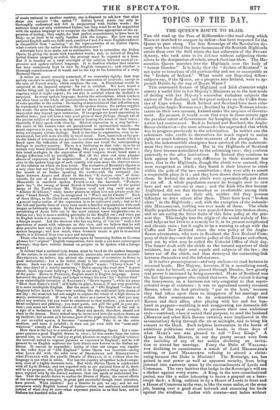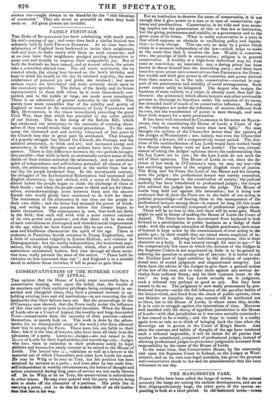TOPICS OF THE DAY.
THE QUEEN'S ROUTE TO BLAIR.
Tits old road up the Pass of Killicrankie—the road along which MACKAY marched to conquer by defeat—has been reopened for the Queen to pass along. The first Sovereign of the Revolution dy- nasty who has visited the inner fastnesses of the Scottish Highlands enters them over the field where the last adherents of the STUART dynasty, who took arms in its defence without subjecting them- selves to the designation of rebels, struck their last blow. The Ha- noverian Queen marches into the Highlands over the body of " bonnie Dundee." It is lucky that the " Ershrie of Scotland" is not quite so tenacious of old partisanship and not so susceptible as the " Ershrie of Ireland." What would our Repealing fellow- subjects say, if the Queen, on a progress into Ireland, were to ap- proach Dublin by the way of Boyne Water ?
This contrasted feature of Highland and Irish character might convey a useful hint to her Majesty's Ministers as to the best mode of dealing with her Majesty's somewhat turbulent subjects the natives of New Zealand, and her quasi subjects on the Caffre fron- tier of Cape colony. Both Ireland and Scotland have been colo- nized by the Anglo-Norman race; Scotland by Anglo-Norman adven- turers on their own account, Ireland under the auspices of Govern- ment. En passant, it would seem that even in those remote ages the peculiar talent of Government for bungling the work of coloni- zation had commenced. Both in Ireland and Scotland, the Anglo- Saxon civilization—the more advanced—has superseded that which was in progress previously to the colonization. In neither can the colonizers take credit to themselves for much regard to native rights or much leniency in their treatment of the aborigines. In both, the indestructible aborigines have survived all the maletreat- ment they have experienced. But in the Highlands of Scotland they have become assimilated to the colonizing race; they conform peaceably to the alien institutions. In Ireland they continue to kick against both. The only difference in their treatment has been, that in the Highlands, though the chiefs were coerced, they were recognized as chiefs : they found it their interest to enter within the pale of the new constitution ; they were able to assert a respectable place in it ; and they have drawn their retainers after them. In Ireland the native chiefs were systematically put down or cut off. A whole population cannot be brought over to new laws and new customs at once ; and the Irish who first became Anglicized did not find themselves so cotnfortable among their adopted associates as their old, neither did they possess influence to draw others after them. There have been" broken clans" in the Highlands ; aud, with the exception of the indomit- able Maconeooas, nothing was ever made of them. The whole Gaelic population of Ireland were pounded down into broken clans ; and we are eating the hitter fruits of this false policy at the pre- sent day. This insight into the origin of the social malady of Ire- land helps us but little to a remedy for it, in its present complicated and chronic state ; but it ought to be a warning to adopt with the Caffre and New Zealand clans the wise policy of the Anglo- Saxon adventurers, who were in Scotland the New Zealand Com- pany of their day—not the unwise policy of the ESSEXES and others, sent out by what may be called the Colonial Office of their day. The former dealt with the chiefs as the natural superiors of their retainers, but as their own equals and subjects of the law ; the latter cut off the chiefs, and thus destroyed the connecting-link between themselves and the inferior race.
It is rather presumptuous—and very useless—to read lectures to crowned heads. Her Majesty, however, if in a moralizing mood, might note for herself', as she passed through Dundee, how greatly real power is increased by being concealed. MARY of Scotland was the last Queen-regnant who visited that town. She visited it during the honeymoon, on a business not very congenial to that super- celestial stage of existence : it was to apprehend sundry recusant Barons, whom she had previously " put to the horn," because they had taken upon them to disapprove of her marriage and refuse their countenance to its solemnization. And those Barons and their allies, after playing with her and her hus- band as puppets—meddling in and exaggerating tne domestic dif- ferences of the royal couple, to promote their own ambitious ends—contrived, when it suited their purpose, to send the husband (MORTON and other Kirk Barons certainly were implicated in the assassination) flying through the air at midnight, and to bring his consort to the block. Such helpless instruments in the hands of ambitious politicians were crowned heads, in those days of what MARY'S son was pleased to call " Free Kings." A Queen is, thank Heaven, in our day pretty secure even from the incivility of any of her nobles declining an invita- tion to attend her marriage. Fancy the Duke of WELLING.. TON declining to countenance a match of Lord MELBOURNE'S making, or Lord MELBOURNE refusing to attend a christ- ening because the Duke is Minister ! The Sovereign, too, has gained in real power as well as apparent security, from being jammed into narrower space by the encroachments of Lords and Commons. The very barriers that hedge in the Sovereign's will are a shelter against every storm. A King, in the ante-constitutional period, was like a sailor labouring to heave a grapnel on a bare- swept deck : a King, cabined in by a House of Lords in front and a House of Commons in the rear, is like the same sailor, at the same job, leaning over a good stout bulwark and stemming his heels against the windlass. Ladies with crowns—and ladies without
crowns too—ought always to be thankful for the "rich blessings of constraint." They are never so powerful as when they least seem so. All great powers are invisible.



























 Previous page
Previous page